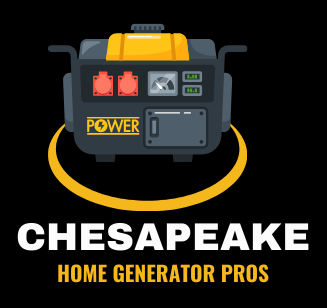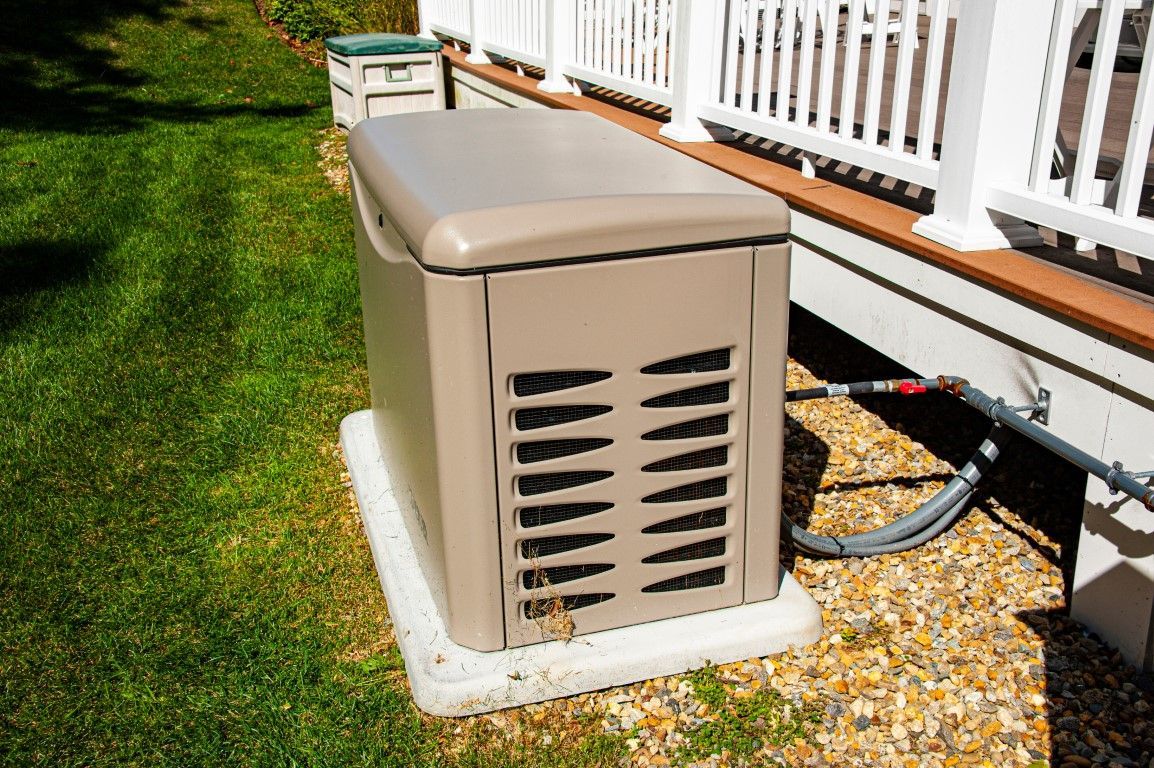
Residential Generators in Chesapeake VA
A residential generator is a backup power system designed to provide electricity to a home during power outages. These generators can power essential appliances and systems, such as refrigerators, heating and cooling units, and lights, ensuring that your daily life continues without interruption. They come in various sizes and types, tailored to meet the specific needs of your household.
Installation Considerations
When installing a residential generator, several factors must be taken into account:
- Size and Power Needs: Choose a generator that can handle your home's electrical load. Consider the number and type of appliances you want to power during an outage.
- Location: The generator should be placed in a location where it can safely exhaust fumes and where it's accessible for maintenance. Typically, it's installed outside, away from windows and doors.
- Permits and Regulations: Check local building codes and regulations in Chesapeake, VA. You may need a permit for installation, and it's important to follow safety standards.
- Professional Installation: Hire a licensed electrician to ensure the generator is installed correctly and safely, avoiding potential hazards.
Operation and Maintenance
Operating a residential generator involves several key steps:
- Starting the Generator: Most generators start automatically during a power outage, but it's essential to familiarize yourself with the manual start process in case of a failure.
- Fuel Management: Ensure that the generator has an adequate fuel supply. Depending on the type, this could be gasoline, propane, or natural gas.
- Regular Maintenance: Perform routine maintenance, such as checking oil levels, air filters, and spark plugs. Schedule professional inspections to keep the generator in optimal working condition.
- Battery Care: Some generators use batteries for starting. Keep the battery charged and replace it as needed to ensure reliable operation.
Initial and Ongoing Investment
The cost of a residential generator involves both the initial purchase and ongoing expenses:
- Initial Investment: This includes the cost of the generator unit itself and installation fees. Prices vary based on the generator's size, type, and features.
- Operating Costs: Regular fuel purchases and maintenance services contribute to ongoing expenses. It’s essential to budget for these to ensure your generator remains functional when needed.
- Potential Savings: Investing in a generator can save you money in the long run by preventing spoilage of food, avoiding property damage, and maintaining comfort during outages.

We will get back to you as soon as possible.
Please try again later.
Troubleshooting Common Issues
Generators, like any mechanical equipment, can experience issues. Common problems include:
- Failure to Start: This may be due to a dead battery, lack of fuel, or a mechanical fault. Check the battery, fuel level, and perform a system check.
- Power Output Issues: If the generator is not providing enough power, inspect the connections and ensure that the generator is the right size for your needs.
- Overheating: Generators can overheat if they are running too long or are placed in a poorly ventilated area. Ensure proper airflow and avoid overloading the generator.
Types of Residential Generators
There are several types of residential generators to consider:
- Portable Generators: These are smaller, mobile units that can be moved as needed. They are ideal for powering a few appliances during short outages.
- Standby Generators: These are permanently installed and automatically turn on during a power outage. They are capable of powering an entire home and are a more comprehensive solution.
- Inverter Generators: Known for their quiet operation and clean power output, inverter generators are suitable for sensitive electronics and can be used for both portable and standby applications.
Importance of Having a Backup Power Source for Homes
Having a backup power source is crucial for several reasons:
- Emergency Preparedness: In the event of severe weather or other emergencies, a generator ensures that you have power for essential services and communications.
- Avoiding Disruptions: Power outages can disrupt daily routines, from cooking and heating to working from home. A generator minimizes these disruptions.
- Protecting Property: A generator helps prevent damage to your home’s systems and appliances, such as frozen pipes and spoiled food, which can be costly to repair.
If you’re considering investing in a
residential generator in Chesapeake, VA or need assistance with installation, operation, or maintenance, contact us today. Our team of experts, is here to help you choose the right generator for your home and ensure that it operates smoothly. Don’t wait for the next power outage—prepare your home with a reliable backup power source now. Feel free to reach out to us for a consultation or to schedule service. We're here to provide the support and solutions you need for uninterrupted power and peace of mind.
Benefits of Having a Residential Generator
In today's world, a reliable power supply is essential for modern living. Unexpected power outages can disrupt daily routines, cause inconveniences, and even result in costly damages. A residential generator offers a practical solution to these problems by providing a backup power source when the main grid fails. Whether you're dealing with a severe storm, an unexpected blackout, or routine maintenance on the power lines, having a generator can ensure that your home remains functional and safe. This article explores the benefits of having a residential generator and why it's a wise investment for homeowners.
Uninterrupted Power Supply
One of the most significant advantages of a residential generator is its ability to keep your home powered during an outage. This means you can continue to use essential appliances like refrigerators, heaters, and lights without interruption. Whether you're in the middle of cooking dinner, working from home, or simply need to ensure that your family remains comfortable, a generator provides peace of mind by maintaining power in all critical areas of your home.
Convenience During Outages
Outages can be inconvenient, particularly if they last for extended periods. A residential generator can make these situations more manageable by keeping your home running smoothly. You won’t need to rely on candles or flashlights for light, and you won’t have to worry about food spoiling in the refrigerator. This added convenience helps reduce stress and allows you to go about your daily activities with minimal disruption.
Protection of Appliances and Electronics
Power surges and outages can damage sensitive electronics and appliances. By providing a consistent power supply, a generator helps protect your valuable devices from potential harm. This is particularly important for high-end appliances and electronics, which can be expensive to repair or replace. A generator ensures that these items remain safe and operational even during power disruptions.
Enhanced Safety
Power outages can pose safety risks, especially if they occur during severe weather or emergencies. Without power, your home may lose its lighting, making it difficult to navigate safely. Additionally, systems like alarms and security cameras might become inoperative. A generator helps mitigate these risks by keeping your security systems and emergency lights operational, thus enhancing the safety of your home and its occupants.
Increased Property Value
Installing a generator can also enhance the value of your property. Many homebuyers view a generator as a valuable feature that adds to the home's appeal, especially in areas prone to frequent power outages. By investing in a residential generator, you're not only protecting your home but also potentially increasing its market value and attractiveness to future buyers.
Peace of Mind
Perhaps one of the most intangible but significant benefits of having a residential generator is the peace of mind it provides. Knowing that you have a reliable backup power source in place can reduce anxiety during storm season or other situations that might lead to a power outage. This sense of security ensures that you're prepared for unexpected events, allowing you to focus on other aspects of your life without worrying about potential power failures.
Investing in a residential generator is a proactive step towards safeguarding your home and ensuring uninterrupted power supply during outages. If you’re interested in learning more about how a generator can benefit you or if you need assistance with installation, don’t hesitate to reach out to us. Our team of experts is here to help you choose the right generator for your needs and provide professional installation services. Contact us today to discuss your options and secure your home with a reliable power solution.
Choosing the Right Generator for Your Home
In today’s world, having a reliable power source is crucial for maintaining comfort and convenience in your home. Whether you're facing frequent power outages or simply want to ensure you’re prepared for unexpected situations, choosing the right generator can make a significant difference. This guide will help you understand the factors to consider when selecting a generator for your home, ensuring you make an informed decision that meets your needs. When it comes to choosing a generator, there are several key aspects to consider. Understanding these can help you select a model that fits your requirements and budget.

Determine Your Power Needs
The first step in choosing a generator is to assess your power needs. This involves calculating the total wattage required to run your essential appliances and systems. Make a list of items you need to power, such as your refrigerator, heating system, lights, and any medical equipment. Add up their wattages to determine the minimum power output required for your generator.
Choose the Type of Generator
Generators come in various types, each suited for different needs:
Portable Generators
These are ideal for temporary power and are often used during camping trips or short-term outages. They are generally less expensive and can be moved easily, but they need to be manually started and require refueling.
Standby Generators
These are permanently installed and automatically start when the power goes out. They are more expensive but provide a seamless power supply and are ideal for homes in areas with frequent outages.
Inverter Generators
Known for their quiet operation and efficiency, inverter generators produce clean energy and are suitable for sensitive electronics. They are typically more compact and portable but can be pricier.
Consider Fuel Type
Generators operate on different fuel types, including gasoline, diesel, propane, and natural gas. Each has its own advantages:
Gasoline
Widely available and usually the most affordable option, but gasoline generators require regular refueling and can be less efficient.
Diesel
More fuel-efficient and often used for larger generators. Diesel generators are durable and suitable for long-term use, but they can be noisy.
Propane and Natural Gas
These options offer cleaner burning and are generally more convenient for standby generators as they can be connected to your home’s existing fuel supply.
Evaluate Noise Levels
The noise level of a generator can affect your comfort and the quality of life around your home. Portable generators tend to be noisier, while inverter generators are designed to operate more quietly. Check the decibel rating of the generator to ensure it meets your tolerance for noise.
Check for Safety Features
Safety is paramount when selecting a generator. Look for models with features such as:
Automatic Shutoff
This prevents damage by shutting down the generator if it detects low oil levels or other issues.
Carbon Monoxide Detectors
Essential for preventing carbon monoxide poisoning, especially for portable generators used in enclosed spaces.
Overload Protection
This feature helps protect both the generator and your appliances from damage caused by overloads.
Budget and Warranty
Finally, consider your budget and the warranty offered by the manufacturer. Generators vary widely in price depending on their capacity, type, and features. Investing in a high-quality generator with a solid warranty can provide peace of mind and ensure long-term reliability.
Choosing the right generator can be a complex decision, but understanding your needs and the available options can simplify the process. If you have questions or need assistance in selecting the perfect generator for your home, don’t hesitate to reach out to us. Our experts are here to help you navigate your options and find the best solution for your power needs.
Contact us today to discuss your requirements and get personalized recommendations. Ensure your home is prepared for any situation with the right generator. We look forward to helping you find the perfect match for your needs.
Let's Connect!
As power outages become increasingly common, having a reliable backup generator can make all the difference. We specialize in providing top-notch generator installation and maintenance services to keep our customers prepared for anything. Whether you're looking for a whole-house generator or a small portable unit, we have the knowledge and expertise to help you choose the right option for your home and budget. Don't let life's unexpected power outages catch you off guard—hire us today and enjoy peace of mind knowing that your home is protected.